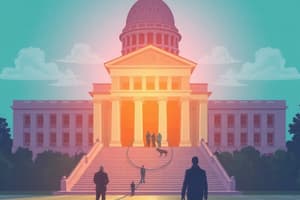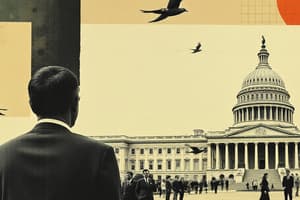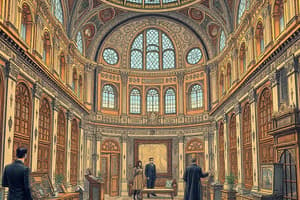Podcast
Questions and Answers
What was the primary outcome of Plessy v. Ferguson (1896)?
What was the primary outcome of Plessy v. Ferguson (1896)?
- Separate facilities are inherently unequal.
- All public facilities must be integrated.
- Separate facilities are permissible if they are equal. (correct)
- African Americans cannot be denied access to public services.
Which amendment allowed women to vote?
Which amendment allowed women to vote?
- 19th Amendment (correct)
- 24th Amendment
- 26th Amendment
- 15th Amendment
What did Brown v. Board of Education (1954) establish?
What did Brown v. Board of Education (1954) establish?
- Public facilities may remain segregated.
- De facto segregation is lawful.
- Separate facilities in education violate the principle of equality. (correct)
- Segregation is allowed as long as facilities are equal.
What does the term de jure segregation refer to?
What does the term de jure segregation refer to?
Which case ruled against state laws that allowed whites to vote only in primaries?
Which case ruled against state laws that allowed whites to vote only in primaries?
What did the 24th Amendment achieve?
What did the 24th Amendment achieve?
Which of the following was a significant result of the Heart of Atlanta Motel case?
Which of the following was a significant result of the Heart of Atlanta Motel case?
In Korematsu v. United States (1944), what was the court's view on the internment of Japanese Americans?
In Korematsu v. United States (1944), what was the court's view on the internment of Japanese Americans?
Which act stated that marriage is defined as between a man and a woman?
Which act stated that marriage is defined as between a man and a woman?
What was established in Reed v. Reed (1971)?
What was established in Reed v. Reed (1971)?
What does the term 'bureaucracy' refer to in the context of government?
What does the term 'bureaucracy' refer to in the context of government?
Which of the following is an example of a government corporation?
Which of the following is an example of a government corporation?
What is the primary function of independent regulatory commissions?
What is the primary function of independent regulatory commissions?
What significant change did the 13th Amendment bring about?
What significant change did the 13th Amendment bring about?
How does fiscal policy differ from monetary policy?
How does fiscal policy differ from monetary policy?
What landmark ruling was established in Dred Scott v. Sandford?
What landmark ruling was established in Dred Scott v. Sandford?
Which amendment addresses birthright citizenship?
Which amendment addresses birthright citizenship?
What is the purpose of OSHA (Occupational Safety and Health Administration)?
What is the purpose of OSHA (Occupational Safety and Health Administration)?
Which independent executive agency is responsible for space travel?
Which independent executive agency is responsible for space travel?
What does the FDIC do?
What does the FDIC do?
Flashcards
Bureaucracy
Bureaucracy
The system by which the executive branch implements policies.
Civil Service
Civil Service
Another term for the bureaucracy, referring to the government employees who carry out day-to-day operations.
Spoils System
Spoils System
The practice of awarding government jobs to supporters of the winning political party.
Patronage
Patronage
Signup and view all the flashcards
Independent Executive Agencies
Independent Executive Agencies
Signup and view all the flashcards
Independent Regulatory Commissions
Independent Regulatory Commissions
Signup and view all the flashcards
Government Corporation
Government Corporation
Signup and view all the flashcards
Fiscal Policy
Fiscal Policy
Signup and view all the flashcards
Monetary Policy
Monetary Policy
Signup and view all the flashcards
Dred Scott v. Sandford (1857)
Dred Scott v. Sandford (1857)
Signup and view all the flashcards
Jim Crow Laws
Jim Crow Laws
Signup and view all the flashcards
Plessy v. Ferguson (1896)
Plessy v. Ferguson (1896)
Signup and view all the flashcards
Brown v. Board of Education (1954)
Brown v. Board of Education (1954)
Signup and view all the flashcards
De Jure Segregation
De Jure Segregation
Signup and view all the flashcards
De Facto Segregation
De Facto Segregation
Signup and view all the flashcards
Civil Rights Act of 1964
Civil Rights Act of 1964
Signup and view all the flashcards
15th Amendment
15th Amendment
Signup and view all the flashcards
Smith v. Allwright (1944)
Smith v. Allwright (1944)
Signup and view all the flashcards
19th Amendment
19th Amendment
Signup and view all the flashcards
24th Amendment
24th Amendment
Signup and view all the flashcards
Study Notes
Bureaucracy and Financing Government
- Bureaucracy is the way the executive branch carries out policies.
- Civil service is the bureaucracy.
- The spoils system gives jobs to supporters.
- Patronage is giving jobs to supporters.
- Independent executive agencies operate outside the executive branch (e.g., NASA).
- Independent regulatory commissions regulate business activities (e.g., FCC).
- Government corporations are businesses set up by the government because private businesses wouldn't make a profit (e.g., the postal service).
- Fiscal policy involves taxes and government spending, controlled by Congress.
- Monetary policy is controlled by the Federal Reserve, adjusting interest rates and the money supply.
- NASA is responsible for space travel.
- SEC regulates stock and bond trading.
- FCC regulates communication technologies (e.g., broadcasting).
- Amtrak is the national train system.
- USPS delivers mail.
- FDIC insures bank deposits.
- OSHA focuses on workplace safety.
- DNI synthesizes information from different intelligence agencies.
- CPSC ensures product safety.
- EPA regulates pollution levels.
- FED controls the money supply.
Studying That Suits You
Use AI to generate personalized quizzes and flashcards to suit your learning preferences.




